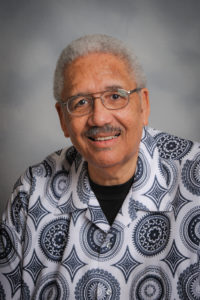Dr. Owen Cardwell had been pondering what could be done about gun and gang violence in his hometown. A pastor in Lynchburg, Cardwell also is the University of Lynchburg’s Rosel Schewel Distinguished Professor of Education and Human Development and co-director of the University’s Center for Education and Leadership.
Throughout his career in the ministry and education, Cardwell has worked with numerous groups, including the Search Institute, Gallup, Journeys Map, the Virginia Department of Criminal Justice 24th Court Services Unit, TAPS Academy, Lynchburg Police Department, and Diamond Hill Baptist Church, where he is pastor.

He wondered if he could bring these groups together for a common good. “I began to think about the various networks I had worked with … and thought maybe we could bring those together,” he said. “Many had never worked with each other. Some didn’t even know about the others.”
Cardwell also was inspired by Good Gang USA, a Houston program founded in 1994 that “empower[s] youth to become leaders in their generation by preparing themselves through self-discipline, personal development, and collective interdependence” and aims to build “a movement of empowered youth leaders who inspire and influence their peers to strive for personal and collective significance and success.”
This fall, in partnership with the Lynchburg Police Department and the Virginia Department of Juvenile Justice 24th District Court Service Unit, Cardwell will launch Good Gangs.
The program is “kind of based on Maslow’s hierarchy of needs,” he said. “Young people need to belong. It’s natural for them to want to have their little networks, clubs, and gangs. The idea of Good Gangs is, ‘What is the motivator for belonging?’ We’re trying to turn the attention to something positive from something negative.”
Good Gangs, which is associated with the University’s Lynchburg Tomorrow initiative, is funded by two grants: a $150,000 Virginia Community-Based Gun Violence Intervention Grant from the Virginia Department of Criminal Justice Services and $66,000 from the Teen and Police Service, or TAPS, Academy.
It’s aimed at high school-aged students from Lynchburg and the surrounding counties who have been referred to the Virginia Department of Juvenile Justice 24th District Court Service Unit. These referrals could be due to crimes committed, but also because of things like truancy.
Every eight months over the two-year grant period, cohorts of 24 to 30 students will cycle through the program’s three components: TAPS Academy and TAPS Clubs, Search Institute, and Journeys Map.
The TAPS portion of the program will include a curriculum — TAPS Academy — taught by four Lynchburg police officers. The modules, according to the TAPS Academy website, are “designed to help youth: change behavior, learn responsible decision-making, participate in crime prevention projects, and reduce the social distance between themselves and law enforcement.”
This segment also will include TAPS Clubs, group mentoring sessions led by civilian community members. Throughout the program, Good Gangs will use what Cardwell described as “cluster mentoring,” with six to 10 participants per group, as opposed to one-on-one mentoring. The idea, he said, is that participants will “form their own ‘Good Gang.’”
The second phase of the program focuses on developmental assets and relationships. “It’s based on research that the Search Institute has done over several years,” Caldwell said. “The idea is that if young people have a certain number of assets, whether they are generated by the community and their social network or whether they are a personal value system, they’re much less likely to be involved in risky behavior.
“The Search Institute identified 40 assets, 20 external and 20 internal. Initial research said young people have to have about 30 assets in play to not be involved in risky behavior, but more recent research … has said we can build on them, even if they have just one, by adding community support and positive relationships with another caring adult. That’s where the developmental relationships idea comes in.”
Caldwell described the third piece of the program, Journeys Map, as “the GPS for career and technical education.” Like a GPS helps map a road trip, Journeys Map helps students map the path to their future career.
“A 10th grader wants to be a video game designer,” Cardwell said, by way of example. “The map might say, ‘This is what you need to do, the courses you need to take by going to college or technical school or the military.’
“These are all pathways you can take to become a video game designer. And for a little more money — we’re trying to find it — we can customize Journeys Map to the curriculum at Lynchburg City Schools. We can even go down to lesson-plan level.”
Each cohort will have a service learning component and Cardwell would like to see the groups take field trips to local points of interest, including the University’s Claytor Nature Center in Bedford County and Anne Spencer House and Garden Museum, a historic site in downtown Lynchburg that partners with the University.
“I don’t know that those kinds of exposures happen for many of these kids,” Cardwell said.
Meetings for all Good Gangs sessions will be held at Diamond Hill Baptist Church and mentors will be recruited from the surrounding community.
“The biggest thing is that people have to see this as a long-term commitment,” Caldwell said. “These kids are very often let down by adults, so my mantra has been, ‘If you don’t plan to stay involved in these young people’s lives, don’t get involved.’
“I’d like to see people who are really willing to be there for at least eight months of a cohort. If we could have them the full two years, I’d love that.”

